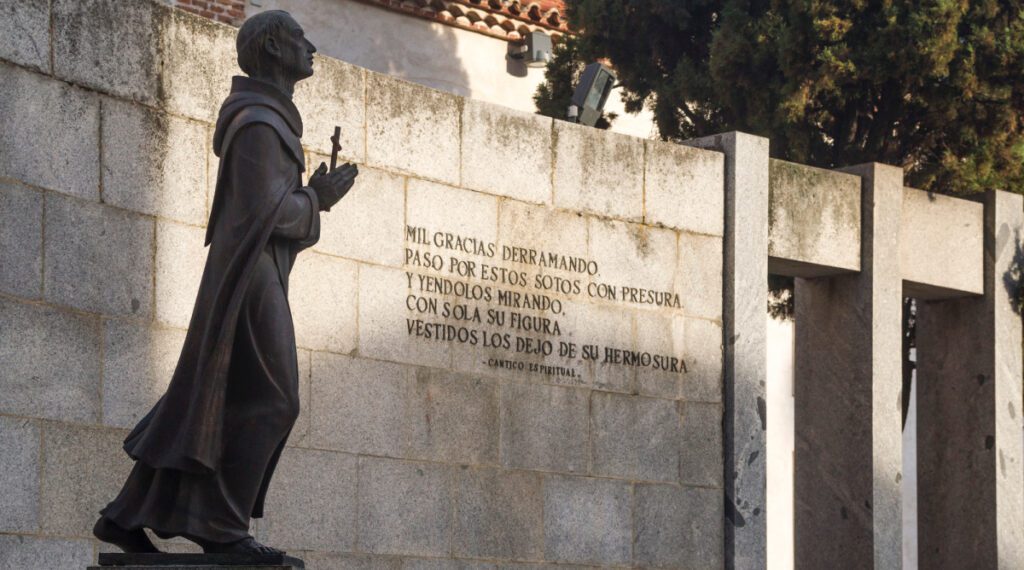“On these two commandments depend all the law and the prophets” (Matthew 22:40).
As human beings we tend to think that life is difficult and complicated–perhaps because we have an uncanny ability to make life difficult and complicated.
Anyone who has ever done even a minimal amount of soul searching or who is even vaguely familiar with the daily news is faced with the reality that life, for most people, is not something that comes easily. According to God, however, life is meant to be very simple because life according to God comes down to one thing, and one thing only: love!
In the Gospel of Matthew the Pharisees ask which, out of all 613 of the Mosaic laws, is the greatest. Jesus’ response is simple: “You shall love the Lord your God with all your heart, and with all your soul, and with all your mind. This is the great and first commandment. And a second is like it, ‘you shall love your neighbor as yourself” (Mt 22:37-39). For Jesus, life is very simple because the priority of all human life, therefore the one thing that is truly necessary in life, is love.
If Jesus places such an emphasis on love, it is worth asking ourselves, why does God make love the priority of our lives? For those who are inclined to a more practical disposition towards life, one could argue that Jesus makes love the greatest commandment because he wants all of us to get along, live in peace, and have order in our lives. After all, St. Paul encourages the Thessalonians “to aspire to live quietly, to mind your own affairs…so that you may command the respect of outsiders, and be dependent on nobody” (1 Thessalonians 4:11-12).
As good as a quiet life and order are in one’s own personal life and in society at large, the Incarnation has not taken place so that God can fulfill the role of a police officer whose sole purpose is to protect people from harm and keep order, as good and necessary as that role is. Rather, by commanding us to love, God is revealing to us ultimately the desire of His heart, which is that we, His creatures, become like Him, because He our creator desires to share Himself totally and completely with us.
Because love is who God is and what God does, we become like God and share in His life only through love.
There are so many things in life that call out to us for attention and promise us fulfillment, peace, and satisfaction. Yet no matter how good some of these things may be, or how attractive they might appear or even how wonderful they might make us feel, if love of God and love of neighbor is not first place in our hearts, we will never truly be able to appreciate the things of this world appropriately and therefore we will be constantly frustrated, disappointed and restless. The simple reason for this is because our priorities are out of order. The things of this world, even though they may be good in and of themselves, are not meant to be the priority of our lives–which is why the only appropriate place for them is at a distance from the love of God and our neighbor.
With all of this in mind, it would be helpful to sincerely ask ourselves, am I loving God and my neighbor in my life right now? Or am I just simply thinking about loving God and others or pondering it during prayer? Love is one of those things that is easy and even consoling most of the time to meditate on and prayerfully consider. It is loving itself, though, not simply thinking or praying about it, that is the real challenge. If we desire to be authentic disciples of Christ and experience intimacy with God, saying yes to this challenge of love is never an option. Jesus reaffirms this when he says in the Gospel of John, “By this all men will know that you are my disciples, if you have love for one another” (John 13:34).
For each one of us to better assess the degree of love that may be present or absent in our life, I would like to propose a short examination for us regarding three areas of our life: prayer, relationships, and work. In my life of prayer am I truly loving God or am I just seeking to be consoled, entertained, or simply going through the motions? One of the dangers of having a relatively structured prayer life, meaning a certain time each day that I devote to prayer, is that my prayer can very easily become routine and even though I may be there physically, my heart may be somewhere else. Hence, it is very possible, and even very probable at times, that during prayer I may not actually be loving God.
In my relationships or among those many different people that I encounter each day who qualify as my “neighbor,” am I truly trying to love each person? Am I sincerely open to them? Do I treat the people in my life, whether I am naturally attracted to them or not, as means to a certain end? Am I consciously trying to love the neighbor in my life right now? It is often all too easy for us to discard certain people in our life, especially those many people whom we may not have a particular relationship with or those who are in some way estranged from family, friends, or society, as a nuisance or even a threat. By doing so not only do we fail to see the eternal significance for us of each person, but we also ignore Jesus himself, who in the Gospel of Matthew reminds that it is he himself who is visiting us through others. Therefore, when we ignore them, we ignore Jesus for, “as you did it not to one of the least of these, you did it not to me” (Matthew 25:45).
In my work, whatever form that may take, do I approach work with a loving and generous disposition, the disposition of a servant who freely gives of his time and talent for others? Or do I see work as simply something to endure, or something I do for only worldly gain or for a practical outcome? Or even worse, is my work merely an attempt to glorify my own ego so as to win the praise and esteem of others? The truth is, regardless of our occupation and the social class we may belong to, even the most basic and mundane job can have eternal consequences when that action is done out of love for God and others. Hence, the most important work, at least according to God, is not the one with the biggest paycheck, but the one that is done with the most love.
In one of his letters, St. John of the Cross writes, “Where there is no love, put love, and you will draw out love.”[1] Such simple, practical, and profound advice! Hence, if prayer has been difficult lately, dry, or even boring, choose to love God during prayer regardless of what your experience may be, and I guarantee your prayer will change, maybe not on an emotional and feeling level, but in the depths of your soul you will experience a shift.
If there is tension or turmoil in a relationship, choose as best as you can to love the other person regardless of what you may feel or what they might have done to you and at the very least you will begin to change and most likely so will that relationship.
If work is burdensome or difficult, try as best as you can to offer your work for the love of God and others, and I guarantee you that your experience of work will take on a much deeper and even more fulfilling role in your life.
There is a fact about life that many of us, at the very least, find frustrating. The fact is that most of our life is out of our control. Despite our best wishes and sometimes even our best efforts, we cannot control God, the people in our life, or the circumstances and situations of our life. We cannot control our life because our life, at least exteriorly, is beyond us. However, what is in our control and not beyond us is how we respond to life.
Jesus reminds us that the best response to life, the best way to live our lives, is make the love of God and neighbor our priority. Love, at least according to God as evidenced in his commandments, is the one thing necessary. It is the one thing that is always needed in our world, especially today, and it is the one thing that can simplify our lives and declutter our hearts and minds and help us to experience the simplicity of life that God always desires for us.
____________________________________________________________________________________
[1] The Collected Works of St. John of the Cross: The Letters (Washington, DC: Institute of Carmelite Studies, 1991),760.
Image: Depositphotos




